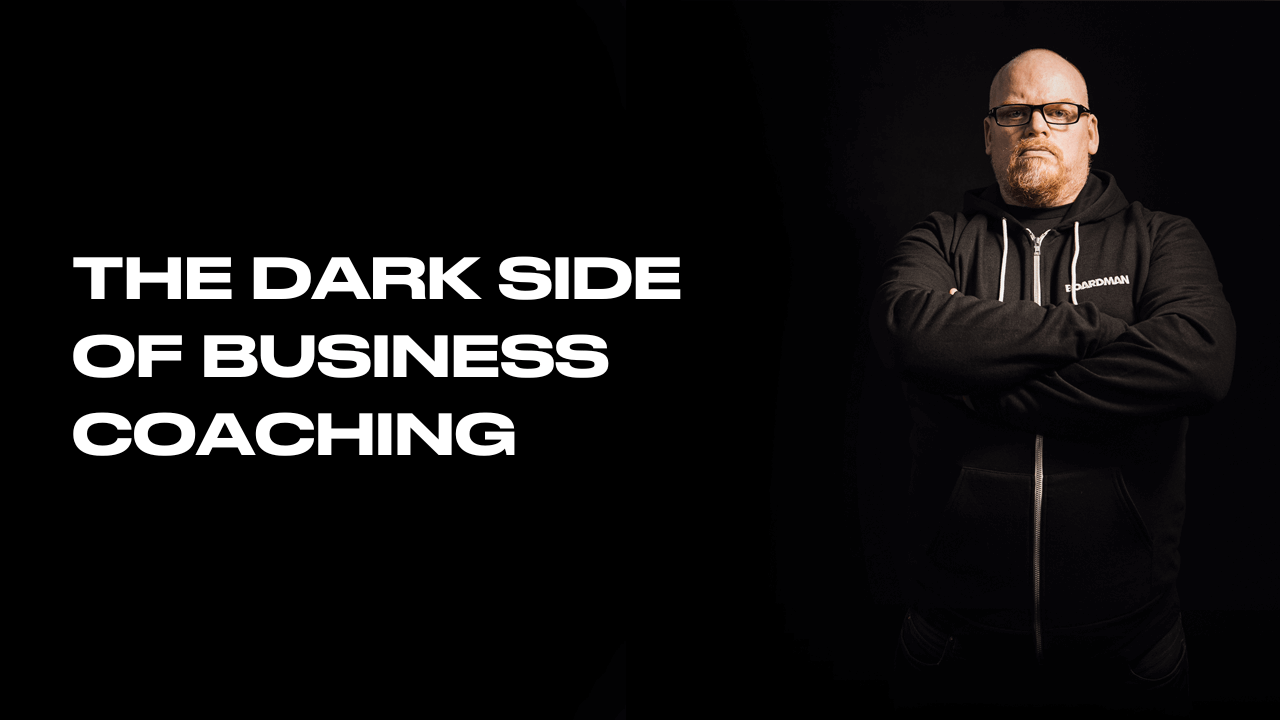
The Dark Side Of Business Coaching
Navigating the Pitfalls and Unmasking Unproductive Practices
The business coaching industry has witnessed exponential growth over the past decade.
As per a report by Market Research Future, the global business coaching market is predicted to reach $11.6 billion by 2025. (*source: https://www.marketresearchfuture.com/).
But while business coaching can be a transformative tool, it's equally important to be aware of its potential pitfalls. In other words, “buckets of benefits but beware of the bullshit”.
Business coaching has become increasingly popular, thanks in part to a rapidly evolving marketplace and the demand for adaptive leadership skills.
The International Coaching Federation reports that there are over 71,000 professional coaches worldwide, a number that has steadily grown over the years (*source: https://coachingfederation.org/research/global-coaching-study).
This surge in demand is driven by the fact that business and executive coaching can be a powerful resource for professionals needing support. It can provide much-needed guidance, improve leadership skills and help navigate the challenges of the business world. But this popularity also has its downsides.
The business coaching industry is largely unregulated. Unlike many professions, anyone can call themselves a business coach, regardless of their qualifications or experience. This lack of oversight can lead to a range of issues, from coaches who offer generic, one-size-fits-all advice to those who simply lack the skills or experience to provide effective guidance.
The real-world implications of these issues can be severe.
For example, a survey by the Harvard Business Review found that 25% of CEOs who hired coaches were doing so for help with conflict management skills, an area that many business coaches may not be equipped to handle (*source: https://hbr.org/2013/01/what-can-coaches-do-for-you).
Let's take a look at two cases that highlight the potential pitfalls of business coaching. In one instance, a fast-growing tech startup hired a business coach to help guide their expansion. The coach, however, lacked the necessary experience in the tech industry and offered generic advice that didn't account for the myriad of unique challenges faced by tech startups today.
The result was a series of misguided decisions that ultimately slowed the company's growth.
The process of trying to rehire a significant number of disgruntled software engineers who choose to leave after the ill-advised recommendations was a lengthy, frustrating and challenging endeavor.
The impact on the organization can be substantial, as finding the right talent to fill the void left by those departing professionals may take considerable time and effort. This is simply pain, you don’t need.
In another case, a business founder engaged a coach to enhance his leadership skills, but found himself grappling with advice that was solely based on theoretical models and failed to consider his specific needs or the company's culture.
This situation echoes the risk of misapplying concepts like radical candor, which can blur the line between constructive criticism and outright rudeness, causing individuals to adopt an unnecessarily harsh demeanor under the pretense of candid communication. As a result, the founder struggled to implement the advice, leading to the coaching having minimal impact on his leadership abilities.
Navigating the Business Coaching Landscape: Strategies and Advice
Given these potential pitfalls, it's essential to approach business coaching with caution. Here are a few strategies to help you navigate the landscape:
Do your homework on the coach
Don’t just rely on testimonials. Look for coaches with relevant industry experience and ask for case studies that demonstrate their effectiveness.
Ask to speak to a current client to validate their claims. Discuss your current, real-world challenges in a discovery call and ask for one piece of practical, actionable advice.
Look for specific, tailored advice
Avoid coaches who rely on a one-size-fits-all approach. The best coaches will tailor their advice to your specific needs and circumstances.
Seek evidence-based methods
Good coaching is based on proven methodologies and evidence. Be wary of coaches who rely too heavily on buzzwords or trendy concepts without providing concrete strategies.
Set Clear Expectations
Before beginning a coaching relationship, discuss and agree upon what you hope to achieve. Having clear, measurable goals can help ensure that the coaching is focused and productive.
Continuous Feedback
A successful coaching relationship should involve two-way communication.
Don't hesitate to provide feedback to your coach about what is or isn't working for you.
A good coach will appreciate your input and adjust their approach accordingly.
Ensure Confidentiality
Your coach should provide a safe space for you to discuss your challenges and goals. Make sure there's a clear agreement about confidentiality at the beginning of your relationship.
Value for Money
Coaching can be a significant investment.
Like any commercial decision or investment, consider the potential return on that investment and weigh it against the cost.
Look for coaches that offer a Money Back Guarantee to reduce that risk.
While coaching doesn't need to be expensive to be effective, be wary of coaches whose fees are significantly lower than the industry average – this could indicate a lack of experience or qualifications.
Choosing a coach based on price is a dangerous move. You wouldn’t trust a cheap doctor with your health would you?
Conclusion
The business coaching industry is a powerful resource, but it's not without its flaws.
By being aware of these potential pitfalls and taking proactive steps to navigate the landscape, you can maximize the benefits of business coaching and help ensure a positive impact on your leadership and your business.
The need for increased scrutiny and standards in the business coaching industry is evident, and the onus lies on us, as consumers, to demand it.
If you are an ambitious professional looking to achieve your business goals and take your business to the next level, click here if you'd like to Book a 30-Minute Coaching Session with Ross.

